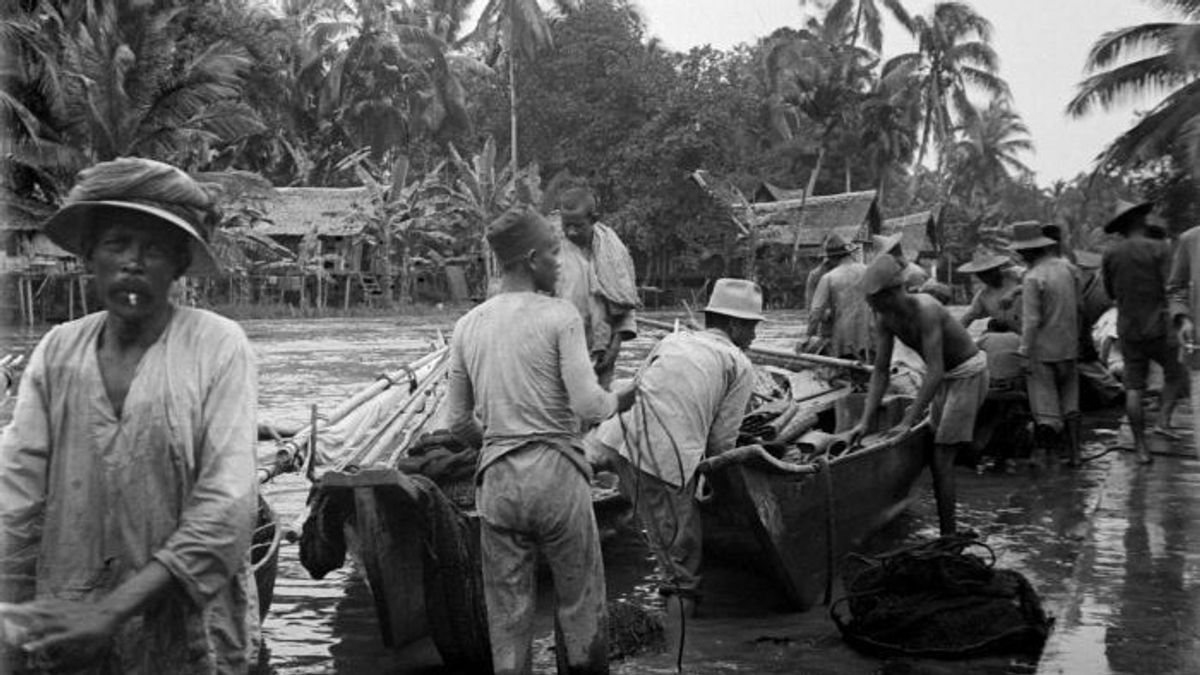JAKARTA - The image of Nusantara as a producer of cheap labor has existed since time immemorial. Under Dutch colonial rule, labor was exploited like a “cash cow.” Especially after the end of forced cultivation. The fate of the workers only moved from the colonial government to the Dutch businessmen.
They get various forms of discrimination, especially regarding salary. The wages of the Bumiputra workers are very low. Meanwhile, Dutch workers get high wages. In fact, the position is relatively the same. The forced cultivation system or cultuurstelsel was considered a Dutch money field.
Since the Governor-General of the Dutch East Indies, Van Den Bosch (1830-1833) initiated in 1830, the strategy of forced cultivation has been quite effective. Profits from plantation commodities that are managed massively are the Dutch gateway to riches.
The blessing of the Dutch forced cultivation was able to pay off the state debt to develop in all fields. This inhuman system lasted 40 years (1830-1870). The Dutch liberals and humanists were the loudest voices to end the forced cultivation system.
However, the abolition of the forced cultivation system did not immediately change the lives of the bumiputras. The Dutch continued to treat Indonesian workers like dairy cows. The only difference is the extortionists. If the period of forced cultivation of labor was extorted by the Dutch colonial government, then the next period of labor was extorted by Dutch private entrepreneurs.
“The suffering of the Indonesian people is only slightly reduced. Their standard of living remains low. Thus, the abolition of Cultuurstelsel does not mean the arrival of prosperity (a standard of living is more than adequate) for the Indonesian people. The standard of living of the Indonesian people is kept low, so that it is easy to find cheap labor.”

“Industrialization was not developed widely so as not to harm the Nederland industry, which did not arise from a strong labor class (union). The agrarian nature of indigenous peoples is maintained and guarded lest the indigenous middle class (national bourgeoisie) arise,” said G. Moedjanto in the book Indonesia of the 20th Century, Volume 1 (1989).
Since then the Dutch no longer use the services of workers from outside the archipelago. The workers generally come from the island of Java. The Dutch tactic was none other than so that there would be no more difficulties or costs for transporting workers.
Rules after rules to keep the workers working were also made by the Dutch. in one of the rules, the fraudulent practice that is often carried out by labor recruitment agencies is cut down. The Netherlands only recognizes recruitment agencies that have obtained a license.
There are also workers who are recruited limited to adult men or unmarried women. This was because children or married women were strictly prohibited by the Dutch from becoming laborers. After that, the Netherlands also improved the labor recruitment system.
“The important developments in the professional recruitment system mentioned above, introduced in 1915. Most of the recruitment has shifted to the recruitment of workers with fixed salaries. Guarantees against ill-treatment have been made through government control.”
“Now, there are two associations that handle their recruitment in Java, namely the General Deli Emigration Office, which was formed by the DPV (Deli Plantation Entrepreneurs Association) and AVROS (General Association of Rubber Plantation Entrepreneurs on the East Coast of Sumatra) and secondly, the South Sumatra Agricultural and Industrial Association. ,” wrote J. Stroomberg in the book Dutch East Indies 1930 (2018).
Pity the workers
The Bumiputra workers became an important element of the economic driving force of the Dutch East Indies, even the Kingdom of the Netherlands. But their livelihood is far from prosperous. Several million people mostly live as the freedom fighter Tan Malaka called it: in the morning they eat, in the evening they don't.
The sadness increases because the workers do not own land. Especially tools. It was the workers who worked hard, the Dutch government and businessmen who actually benefited. Therefore, the Bumiputra workers did not have much hope in life.
For example, in the future, Bumiputra workers can control factory land, transportation equipment, and create trading bodies. “Big profits from sugar, oil, rubber, coffee, tea and others mostly flowed into Europe, into the pockets of the Dutch, and a small part also returned to Indonesia, but not as an increase in workers' salaries, but as an addition to 'capital' that already exists, make it a new 'suction device' as well.”
“Most of the profits are in the Netherlands as verlof salaries or pensions for Dutch employees. Their land was rented and sold until many farmers lost their property. Thus the Indonesian people are getting poorer and poorer because their salaries remain as usual (in fact, they are often lowered). Meanwhile, food items are getting more expensive,” said Tan Malaka as written by Syaifudin in the book Tan Malaka (2012).
Not only that. Tan Malaka witnessed how miserable the life of plantation workers was. He gave an example in a plantation in Deli (North Sumatra), for example. Workers are at the lowest strata of the social system in plantations. Even above the workers, there is the ruling bourgeoisie.

Even then the bourgeoisie is divided into three groups. First, the capitalist group from Europe (America, the Netherlands, and others). Second, the Chinese capitalist group. Third, the capitalist group from the Bumiputra.
All three groups benefited greatly from plantations. They could earn up to tens of thousands of guilders per year. Meanwhile, the Bumiputra workers, who actually worked a lot, had a worse fate than the Dutch workers. Bumiputra's wages are only 0.4 guilders a day. The money if calculated can only buy a piece of cake and a piece of cheap clothes. This condition is also seen in other plantations in the archipelago.
Even when working, the Bumipura workers were often yelled at and beaten by the plantation master or foreman. Another threat to the workers is that they must be prepared to lose their wives and children at any time. The moment of loss was when the plantation owner was interested in making the workers' wives and children as concubines.
"If in the political field all movements of the movement are always supervised, it is the same in the economic field. Small private companies are subject to exorbitant taxes, low salaries or wages for workers are very suppressed and differentiated from the Dutch even though their position is the same as low," wrote the book History of the National Awakening of the East Java Region (1978).
*Read other information about HISTORY or read other interesting articles from Detha Arya Tifada.
Other MEMORIESThe English, Chinese, Japanese, Arabic, and French versions are automatically generated by the AI. So there may still be inaccuracies in translating, please always see Indonesian as our main language. (system supported by DigitalSiber.id)









